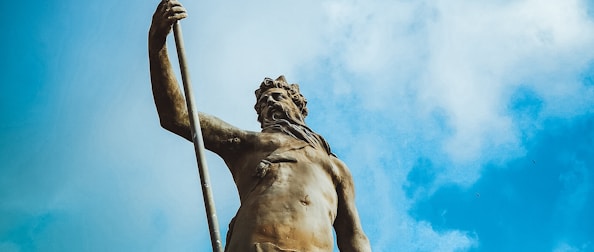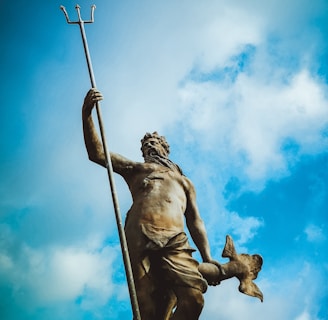Adapting Mythology for Modern Audiences in Fiction Writing
Bibliotheca Exotica
4 min read


Mythology has always captivated readers with its timeless tales of gods, heroes, and epic adventures. From ancient Greek and Norse myths to Indian and African folklore, these stories have shaped cultures and inspired countless works of literature. But how can contemporary writers tap into the power of mythology and adapt it for modern audiences?
Understanding the Appeal of Mythology
Before we delve into the process of adapting mythology for modern audiences, let's first explore why these ancient tales continue to resonate with readers today.
Mythology offers a sense of connection to our past, allowing us to explore universal themes and archetypal characters that still hold relevance in our lives. The gods and goddesses, with their flaws and strengths, mirror the complexities of human nature. The epic quests and battles against supernatural forces reflect our own struggles and aspirations.
Moreover, mythology provides a rich tapestry of symbols, motifs, and themes that can be reimagined and repurposed in contemporary storytelling. By drawing from these ancient sources, writers can infuse their narratives with a sense of depth and resonance that resonates with readers on multiple levels.
The Challenges of Adapting Mythology
While the allure of mythology is undeniable, adapting these ancient tales for modern audiences presents its own set of challenges. Writers must strike a delicate balance between staying true to the source material and making the stories accessible and relevant to today's readers.
One of the primary challenges is the cultural and historical context in which mythology originated. Ancient myths were shaped by the beliefs, values, and social structures of their time. Adapting these stories requires an understanding of the cultural nuances and the ability to translate them into a contemporary context.
Another challenge is the language and narrative style of mythology. Ancient myths often feature poetic language, elaborate descriptions, and a nonlinear storytelling approach. While these elements contribute to the enchantment of the original tales, they may not resonate with modern readers who are accustomed to a more direct and streamlined narrative style.
Furthermore, mythology can be complex and convoluted, with multiple versions and variations of the same story. Adapting these stories requires careful selection, consolidation, and reinterpretation to create a cohesive and engaging narrative that will resonate with modern readers.
Strategies for Adapting Mythology
Now that we understand the challenges, let's explore some strategies that writers can employ to adapt mythology for modern audiences:
1. Identify the Universal Themes
One of the keys to successfully adapting mythology is identifying the universal themes that underpin the stories. Love, power, betrayal, redemption—these are just a few examples of themes that transcend time and culture. By focusing on these universal themes, writers can create narratives that resonate with readers from different backgrounds and eras.
2. Update the Language and Style
While it's important to respect the poetic language and narrative style of mythology, it's equally crucial to update it for modern readers. Simplify complex language, streamline descriptions, and adopt a more direct and accessible writing style. This will help bridge the gap between the ancient and the contemporary, making the stories more relatable to today's audience.
3. Introduce Diverse Perspectives
Mythology is often dominated by male heroes and gods. To make these stories more inclusive and relevant to modern audiences, writers can introduce diverse perspectives and explore the untold stories of marginalized characters. By giving voice to those who were previously silenced, writers can breathe new life into familiar tales and offer fresh insights.
4. Embrace Cultural Reinterpretation
Mythology is not static; it evolves and adapts with each retelling. Writers can embrace this fluidity and reinterpret the myths through different cultural lenses. By infusing the stories with the cultural nuances and perspectives of diverse communities, writers can create narratives that are both rooted in tradition and reflective of the contemporary world.
5. Blend Mythology with Modern Settings
Another effective strategy is to blend mythology with modern settings. By placing mythological characters and themes in a contemporary context, writers can explore the timeless nature of these stories while making them accessible to modern readers. This juxtaposition of the ancient and the modern can create a unique and compelling narrative experience.
Examples of Successful Mythology Adaptations
Several contemporary writers have successfully adapted mythology for modern audiences, breathing new life into ancient tales. Here are a few notable examples:
1. "American Gods" by Neil Gaiman
In "American Gods," Neil Gaiman weaves together various mythological traditions, including Norse, Egyptian, and Native American, to create a modern-day epic. The story follows Shadow Moon, a former convict who becomes embroiled in a conflict between old gods and new gods in America. Gaiman's masterful blending of mythology with contemporary themes and settings makes this novel a captivating read.
2. "Circe" by Madeline Miller
"Circe" reimagines the story of the infamous sorceress from Greek mythology. Madeline Miller brings Circe to life, exploring her journey from a misunderstood outcast to a powerful witch. Miller's lyrical prose and meticulous research breathe new life into this ancient character, offering a fresh perspective on a familiar myth.
3. "The Penelopiad" by Margaret Atwood
Margaret Atwood's "The Penelopiad" retells the story of Homer's "Odyssey" from the perspective of Penelope, Odysseus' wife. By giving voice to this often overlooked character, Atwood offers a feminist reinterpretation of the myth, shedding light on the experiences and struggles of women in ancient times.
Conclusion
Adapting mythology for modern audiences is a challenging yet rewarding endeavor for writers. By understanding the appeal of mythology, acknowledging the challenges, and employing effective strategies, writers can create narratives that bridge the gap between the ancient and the contemporary. Through these adaptations, mythology continues to captivate and inspire readers, reminding us of the timeless power of storytelling.

